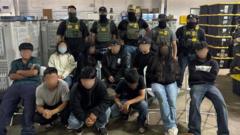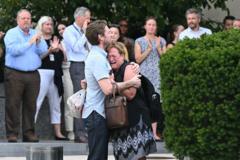Is a Bonfire with Migrant Dummies a New Low for Racism?

Understanding the Moygashel Bonfire Incident: A Deep Dive into Its Implications
The recent incident involving a bonfire in Moygashel, Northern Ireland, has sparked widespread outrage and condemnation, highlighting the complex dynamics of race, immigration, and community identity in the region. The bonfire, which featured a model boat filled with figures representing refugees, was set ablaze under the controversial slogans "stop the boats" and "veterans before refugees." This act has been deemed a hate incident by many, including prominent local leaders and community representatives. In this article, we will explore the various aspects of this incident, including its historical context, the reactions it has provoked, and the broader implications for Northern Ireland's society and politics.
The Context of Bonfires in Northern Ireland
Bonfire celebrations have a long-standing tradition in Northern Ireland, particularly among unionist communities. These events often coincide with the Twelfth of July, commemorating the Battle of the Boyne in 1690, which is a significant date in the Protestant calendar. Each year, communities gather to light bonfires that can vary in size and complexity, often adorned with political messages or cultural symbols.
While many bonfires are festive and community-driven, some have garnered attention for their political and controversial displays. The Moygashel bonfire is no stranger to this, with past incidents including the burning of a mock police car and other politically charged symbols. Such acts underscore the ongoing tensions surrounding identity, cultural expression, and the complex landscape of Northern Irish politics.
The Moygashel Bonfire Incident: What Happened?
On the night of the incident, a model representing a small boat filled with figures interpreted as refugees was set alight, accompanied by signs that read "stop the boats" and "veterans before refugees." This particular display was not only shocking to many but was also interpreted as a direct attack on vulnerable communities, particularly those seeking asylum and safety in Northern Ireland.
The Church of Ireland Archbishop, John McDowell, was among the first to respond to the incident, labeling it "racist, threatening, and offensive." He emphasized that such displays do not reflect the values of Christianity or the majority of the community, instead branding it as "inhuman" and "deeply sub-Christian." His remarks resonate with the sentiment that the actions taken during this bonfire were not merely cultural expressions but rather a harmful narrative against marginalized groups.
Community Reactions: A Divided Response
The response to the Moygashel bonfire has been markedly divided. On one hand, numerous community leaders and political figures, including Sinn Féin Assembly member Colm Gildernew, have condemned the act as "vile" and "deplorable." These reactions emphasize a growing concern about the rise of xenophobia and anti-immigrant sentiments in Northern Ireland, particularly following the Brexit referendum, which has significantly altered immigration policies and public perceptions of refugees.
Conversely, the Moygashel Bonfire Committee defended the display as a legitimate expression of frustration regarding illegal immigration. They argue that the bonfire's “topper” should not be interpreted as hateful but rather as a reflection of local community sentiments regarding immigration policies. This dichotomy in responses showcases the complexities surrounding community identity and the varying perspectives on immigration issues.
The Role of Law Enforcement and Community Safety
In light of the incident, the Police Service of Northern Ireland (PSNI) has launched an investigation, treating the bonfire as a hate incident. In their official statement, they reiterated their commitment to supporting vulnerable communities and emphasized the importance of working collaboratively with local representatives to foster a safe environment for all residents. This proactive approach highlights the role of law enforcement in addressing community tensions and ensuring that incidents of hate are taken seriously.
Societal Implications: The Bigger Picture
The Moygashel bonfire incident is not an isolated event; it is a reflection of broader societal issues regarding race, immigration, and identity. Northern Ireland, while rich in cultural heritage, continues to grapple with historical divides that influence contemporary social dynamics. The rise of nationalist sentiments, especially in the context of Brexit, has created a challenging environment for refugees and immigrants seeking safety and a better life.
As communities navigate these tensions, it is crucial to foster dialogues that address concerns about immigration while also promoting empathy and understanding toward vulnerable populations. Efforts to build inclusive communities can help mitigate the risks of hate incidents and foster a sense of belonging for all residents, regardless of their background.
Looking Ahead: Bridging Divides and Fostering Inclusivity
The Moygashel bonfire incident serves as a catalyst for necessary conversations about race, immigration, and community identity in Northern Ireland. As society grapples with these complex issues, it is imperative to promote inclusivity and understanding while acknowledging the valid concerns of local communities. Initiatives that encourage dialogue, education, and collaboration between diverse groups can pave the way for a more cohesive society.
Local leaders, community organizations, and residents all play a vital role in fostering an environment where diversity is celebrated and embraced. By prioritizing inclusive practices and promoting understanding, Northern Ireland can work toward healing historical divides and creating a society where everyone feels valued and safe.
Frequently Asked Questions
What sparked the controversy around the Moygashel bonfire?
The controversy originated from a model boat representing refugees that was set alight during the annual bonfire event, along with accompanying messages that many interpreted as hateful and xenophobic.
What are the historical roots of bonfire celebrations in Northern Ireland?
Bonfire celebrations in Northern Ireland have historical ties to the Protestant community and the commemoration of the Battle of the Boyne. They are often associated with cultural identity and community pride.
How have community leaders responded to the incident?
Community leaders have expressed strong condemnation of the bonfire display, labeling it as racist and offensive. They emphasize that such actions do not represent the views of the majority within the community.
What steps are being taken by law enforcement in response to this incident?
The Police Service of Northern Ireland is investigating the incident as a hate crime and is working to ensure the safety of vulnerable communities while addressing local concerns.
How can communities work towards inclusivity and understanding?
Communities can foster inclusivity by promoting dialogue, educating residents about diverse cultures, and collaborating on initiatives that celebrate differences while addressing valid concerns surrounding immigration and community identity.
The Moygashel bonfire incident brings to light critical issues surrounding race, immigration, and community identity in Northern Ireland. As society continues to navigate these complexities, it is essential for communities to engage in open dialogues that promote understanding and inclusivity. How can we, as a society, work towards bridging divides and fostering a more inclusive environment for all? #CommunityUnity #InclusionMatters #NorthernIreland
Published: 2025-07-11 22:10:41 | Category: News



